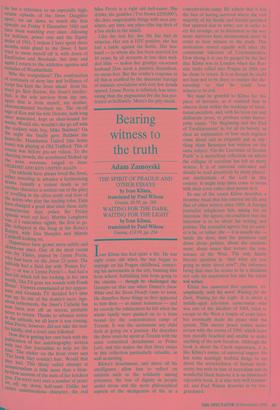Bearing witness to the truth
Adam Zamoyski
Ivan Klima has had quite a life. He was eight years old when the war began to impinge on his Prague childhood, restrict- ing his movements in the city, banning him from school, forbidding him from going to the cinema — though he challenged the Gestapo on that one when Disney's Snow White and the Seven Dwarfs came to town. He describes these things as they appeared to him then — as minor nuisances — and he records the exhilaration he felt when the whole family were pushed on to a train bound for the concentration camp of Terezin. It was the excitement any child feels at going on a journey. He describes the three years he spent at Terezin with the same committed detachment as Primo Levi, and this makes the first three essays in this collection particularly valuable, as well as moving.
Klima's detachment, and above all his intelligence, allow him to reflect on subjects such as the solidarity among prisoners, the loss of dignity in people under stress and the more philosophical aspects of the strangeness of life in a concentration camp. He admits that it was the fact of having survived where the vast majority of his family and friends perished that spurred him to write; not in order to cry for revenge, or to document in the way many survivors have documented; more in order to bear witness to the truth. This motivation served equally well after the communist takeover of Czechoslovakia. How strong it is can be gauged by the fact that Klima was in London when the Rus- sian tanks rolled into Prague in 1968, yet he chose to return. It is as though he could not bear not to be there to endure the dic- tatorship so that he could bear witness to its evil.
We must be grateful to Klima for this piece of heroism, as it enabled him to observe from within the workings of totali- tarian socialism, and, with his keen eye and deliberate prose, to produce some memo- rable essays. 'The Beginning and the End of Totalitarianism' is, for all its brevity, as clear an explanation of how such regimes come about and as elegantly put as any- thing Alain Besancon has written on the same subject. 'On the Literature of Secular Faith' is a marvellous reflection on where the collapse of socialism has left so many writers. It is of universal relevance and should be read attentively by many played- out intellectuals of the Left in this country. It might help them come to terms with their error rather than persist in it.
In one of the essays Klima describes a tiresome ritual that has entered his life and that of other writers since 1989. A foreign journalist telephones him asking for an interview. He agrees, on condition that the interview is to be about his writing, not politics. The journalist agrees, but no soon- er is he, or rather, she — it is usually she — inside the door, than the questions rain down about politics, about the environ- ment, about issues that torture the con- science of the West. The only faintly literary question is: 'And what are you going to write about now?', the inference being that once he ceases to be a dissident not only his inspiration but also his talent will wither.
Klima has answered that question, tri- umphantly, with his novel Waiting for the Dark, Waiting for the Light. It is about a middle-aged television cameraman who was one of the idealists of 1968, tried to escape to the West a couple of years later, but eventually made his peace with the system. This uneasy peace comes under review with the events of 1989, which leave him morally beached and unable to make anything of the new freedom. Although the book is about the Czech experience, it is, like Klima's essays, of universal import. He has some searingly truthful things to say about the wretchedness of human medi- ocrity, but with its hint of surrealism and its wonderful black humour it is an immensely enjoyable book. It is also very well translat- ed, and Paul Wilson deserves to be con- gratulated.


































































 Previous page
Previous page